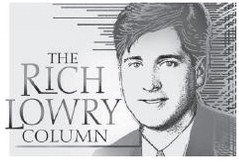Scalia Was Right — Again
Justice Antonin Scalia was among the most prescient Supreme Court justices in American history, and the firestorm over the leak of Justice Samuel Alito’s draft opinion overturning Roe is a reminder of it. In Planned Parenthood of Southeastern Pennsylvania v. Casey, the 1992 Supreme Court decision upholding (and amending) Roe v. Wade, the justices in the majority believed that they could settle once and for all the dispute over abortion.
Scalia thought this was outlandishly wrongheaded and said so in a dissent that looks farsighted 30 years later. Not only did the Court fail to calm the political waters on abortion, it made itself central to the political and moral argument over the issue. If there’s any doubt about that, consider the security fencing reminiscent of the days after January 6 that is now going up around the Supreme Court building. Consider the left-wing group planning protests at the homes of conservative justices. Consider the proposal from Sen. John Cornyn of Texas that justices get 24/7 security details. It’s extraordinary that now, at the very least, the whiff of physical intimidation is part of the Court’s deliberations on Roe. Scalia might be surprised by that, but not that abortion has remained a point of contention over the decades, despite the Court’s preposterous belief that it could make itself the final arbiter. In his dissent in Casey, Scalia analogized the Court’s jurisprudence on abortion to its decision in Dred Scott v. Sandford, the notorious 1857 case in which the Court denied the petition of a slave named Dred Scott for freedom. The Court issued a sweeping decision, declaring unconstitutional the Missouri Compromise of 1820 that had banned slavery north of latitude 36 degrees 30’ in the Louisiana Purchase. It did this, in part, because it thought it could forge a settlement on slavery that had eluded the political branches.
Instead, the Chief Justice Roger Taney made himself infamous for a decision that, like Roe and Casey, was wrongly decided, that entrenched and extended a profound social wrong, that short-circuited democratic decision-making, and that utterly failed to create political and social peace.
The decision was immediately excoriated by opponents of slavery in the harshest possible terms. They called into question its legitimacy and indeed the legitimacy of the Court itself. Serious and sober-minded men like Abraham Lincoln and William Seward advanced conspiracy theories for how the Court could have arrived at such an atrocious place. (There were indeed improprieties around the Court’s deliberations.)
Scalia invoked a portrait of Roger Taney at Harvard Law School by the great painter Emanuel Leutze in 1859. “He sits,” Scalia wrote, “facing the viewer and staring straight out. There seems to be on his face, and in his deep-set eyes, an expression of profound sadness and disillusionment.” Scalia imagined him despairing at what his ambitious ruling in Dred Scott had wrought and warned the Court against making the same mistake again.
“It is no more realistic for us in this litigation than it was for him in that,” Scalia noted, “to think that an issue of the sort they both involved — an issue involving life and death, freedom and subjugation — can be ‘speedily and finally settled’ by the Supreme Court …”
Rather, Scalia argued, “By foreclosing all democratic outlet for the deep passions this issue arouses, by banishing the issue from the political forum that gives all participants, even the continued from page
losers, the satisfaction of a fair hearing and an honest fight, by continuing the imposition of a rigid national rule instead of allowing for regional differences, the court merely prolongs and intensifies the anguish.
“We should get out of this area,” he urged, “where we have no right to be, and where we do neither ourselves nor the country any good by remaining.”
The Court should have listened to Scalia the first time. Now, Alito’s opinion opens the way for it, after one of the most catastrophic misadventures in its history, to finally heed his wisdom.
Rich Lowry is editor of the National Review.
Synd., Inc.






out of
Posted on